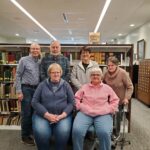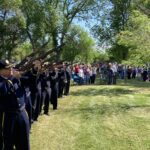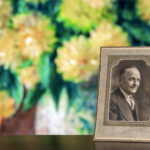

Remember that feeling of running to the mailbox as a kid on your birthday? How you couldn’t wait to see which grandparents or aunts and uncles had sent you a card or maybe even a gift?
As an adult, your neighbors might start talking if you run to your mail. But I think that little spark of excitement is still with us, birthday or not. There’s always hope that something you’ve been waiting for will be there. Maybe it’s the magazine you love (like this one!) or a letter from a friend. Whatever it is, it brightens your day because you feel closer to the person who sent it, even if distance keeps you apart. Since living through a pandemic, that feeling has become more precious than ever.
Our elderly and nursing home residents in Aberdeen are not miles away from us, but the distance they feel from the rest of the community has grown significantly during COVID. While many of us use technology to help fill the gap of not being with our loved ones as often, we know this doesn’t completely fill the void. This is especially true for our senior population.
Jamie Forrest is a physical therapist working out of Prairie Heights Healthcare for in-home patients, nursing homes, and assisted and independent living facilities. She explained, “The pandemic does affect those of us who were relying on technology and smartphones to communicate beforehand, but maybe not to the point that it affects our elderly. For this generation, texting or facetime is entirely new, and they are suffering even more from the lack of personal communication because it just doesn’t compare to visiting face-to-face with your family.”
She added, “Getting mail matters to them so much because that’s what they’re used to.”
Jessica Rehder, sales director at Primrose Retirement Community, agreed, “This generation resonates with handwritten cards and notes. They love to walk to their mailboxes and see what’s there. It means so much more to them.”
Not all Aberdeen residents in assisted living and long-term care facilities have family who can mail them letters or things to do to stay busy. This is where individuals, churches, and businesses in the community have stepped in.
Rehder said, “We have been so lucky during this season. We’ve had cookies delivered by local sports teams, cards dropped off by strangers, musicians playing in the parking lot, decorated cars and parades outside. People are using their talents just to entertain our residents and be there for them.”
Primrose also partnered with an Aberdeen school to pick up artwork from the students once a week. They hung it in the hallways, and the residents wrote notes back to the students. Tom Snyder, administrator for Avera Mother Joseph Manor Retirement Community, shared similar stories. He added that care facilities have also worked hard to maintain safe outdoor and indoor visiting areas for their residents.
During the holidays, all it took was a few Facebook posts for the Aberdeen area to pitch in and donate over 900 cards for nursing homes and assisted living residents here and in several surrounding communities. Forrest and her family helped with this holiday project by getting cards for all the Primrose locations in town. She said it hit home for her how much even this small gesture means to people when one of her patients showed her the card she’d received.
“My patient didn’t know it was from me right away because we had just written in the cards ‘from your friends in the Aberdeen community.’ She was in tears when she showed it to me because she was so touched to know that people thought about her. The kindness of someone going out of their way to send a card to a stranger seems so small, but it can mean so much, especially when you aren’t able to go out and about and see others like you used to.”
Everyone we spoke to for this story who works with the elderly said they have seen an emotional, mental, and physical decline in their residents due to the isolation brought on by the pandemic.
Rehder talked about this specifically. “First and foremost, the hardest part is not seeing their friends and family. Along with that, it’s also difficult not to see your medical team in person. The medical teams have been amazing, but when you meet a patient virtually, it’s just not the same as seeing the whole person face-to-face.”
She added that even for residents who don’t fall ill with COVID, the virus still causes a decline in health because of the isolation. “This is especially hard for people with dementia who haven’t seen their loved ones in so long. The decline that happens with that disease is so hard, and it’s so hard on the families too.”
Nathan Gelhaus of Angelhaus Retirement and Assisted Living echoed these thoughts. “It’s one thing to get the virus and know what’s happening to you and why you feel sick. But it’s entirely another if you have severe dementia and don’t understand why you don’t feel well or what’s going on.”
Navigating a pandemic is awful. Doing so without immediate access to the outside world via your computer or smartphone creates a lack of human contact that most of us can’t imagine.
Forrest said, “I think of my teenagers who can just pick up their phone, send a text, and instantly be talking with their friends. It’s hard to understand what it would be like not to reach people or hear from the outside world whenever we want to. That’s why anything that comes in through the mail—letters, crossword puzzles, postcards, is so important. It doesn’t have to be big, but these little, needed upbeats just give residents an extra boost in their day and are so appreciated right now.”
How You Can Help
When we asked nursing homes what the Aberdeen community can do to support their residents, they all said the same thing:
Most importantly, wear your mask, social distance, and when you can, get your vaccine.
“The best thing we could all do as a community is to wear our masks and honor social distancing guidelines,” said Nathan Gelhaus. “It’s not a political issue; it’s simply showing a level of respect for each other and goodwill toward your neighbors.”
“The most impactful thing you can do to help us get past this thing is wear your mask,” agreed Tom Snyder. “We need to get our community healthy so that we can start opening back up and getting back to normal again.”
Next, check on your loved ones who live alone. Jessica Rehder said, “Make a point to call them at least once a week. If you live by yourself, it’s definitely not easy to be isolated for so long.”
And if you’re able, use the mail to send residents little things that will boost their day or give them access to the outside world. Some ideas could be:
- Cards or letters
- Snacks or goodie bags
- Notepads and pens
- Puzzle books, crosswords,
or word searches - Pen pal letters
- Stationary
- Coloring books
- Postcards with stamps
“Small gestures like these help us to feel like we’re still connected to the community,” Snyder said.
Even if you don’t have a loved one in nursing home care, you can still help.
Rehder said, “You don’t have to know someone personally. Nursing home staff will know which of our residents do not have family and could use a little something extra, and we will pass your gifts on to them.”
Above and Beyond
“I can’t say enough about what our staff has done during COVID,” said Nathan Gelhaus.
After an outbreak hit their facilities in October, Angelhaus went from having zero cases one day to 13 positives out of 25 residents the next. It was a challenging few weeks with staff being out sick and many of their residents bed-bound. “Everyone stepped in to do things that normally would be outside of their roles to get us through, from cooking in the kitchen to cleaning and everything else that needed to be done.”
Jessica Rehder said that throughout the virus, especially during the restricted visitations phase, staff have had to play the role of family and visitors along with their typical responsibilities.
“Most staff working in senior living have worked short-handed due to coworkers being out because of the virus. When COVID hits their personal circle, you have a situation where a frontline worker, who is not getting compensated enough for all they do in the first place, has to miss work for 10 to 14 days. So along with their health, the virus is affecting their paycheck, and affecting their coworkers who are working short-staffed.”
Tom Snyder added, “I could not be more proud of our staff. They’ve met so many challenges from the virus with dedication to our residents and this facility. We’ve had some difficult times, and our staff has pulled together, helped each other out, and been so compassionate with our residents. It’s beyond what I could have hoped for.”
He listed wearing masks and face shields for long periods of time, going through COVID screening and testing daily, adhering to extra infection control, and social distancing measures, working more shifts, helping families through this time of limited visitation, keeping residents active and engaged during quarantine, and grieving when a resident loses their fight with the virus as just a few of the things he’s seen nursing home staff handle all at once with grace.
View more articles about:















